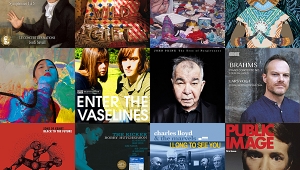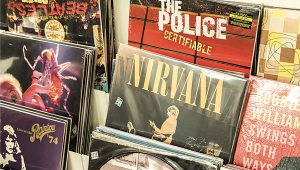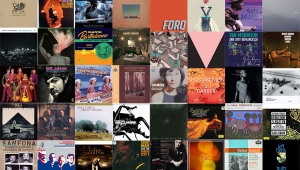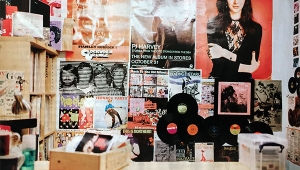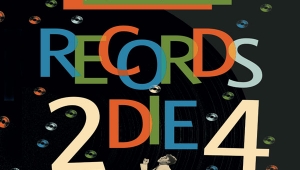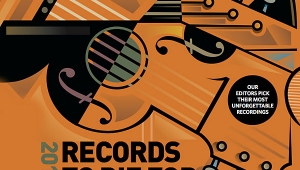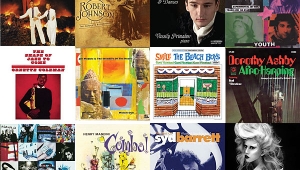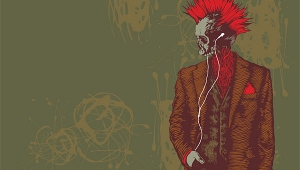| Columns Retired Columns & Blogs |
2004 Records To Die For Page 3
PAUL BOLIN
BEETHOVEN: Symphonies 8, 9
Bruno Walter, Columbia Symphony Orchestra
Columbia M2S 608 (2 LPs). 1960. John McClure, prod. AAA. TT: 97:37
In my unabashedly biased opinion, nobody but nobody has ever surpassed the great Bruno Walter in the core German symphonic repertoire. Walter's fuller textures and gemütlich but highly disciplined approach to Beethoven are somewhat out of fashion in this age of instrumental originalism, but these interpretations sing with nobility and the sensibilities of a conductor whose life overlapped that of Johannes Brahms and whose mentor was Gustav Mahler. One may quibble about whose is the finest Ninth, but Walter's is still competitive, and his Eighth is a complete delight. Sonically, the McClure Columbias are rather variable, but these symphonies were recorded in satisfying, full-blooded sound.
PORCUPINE TREE: Coma Divine
Delirium DELEC CD067 (UK CD). 1997. Steven Wilson, prod. DDD. TT: 77:00
It's easy to see why this British neo-psychedelic quartet was touted as the "new Pink Floyd," though that hardly does them justice. PT's guiding light, guitarist-singer-songwriter Steven Wilson, is a renaissance man of progressive rock. This live recording shows the band in complete command of the lush, multilayered textures that are their stylistic trademark. Richard Barbieri's deep-space keyboard washes and the tremendously supple yet forceful rhythm section of bassist Colin Edwin and drummer Chris Maitland provide an enveloping soundscape for Wilson's dark visions and superb guitar work. The sound is excellent for a live recording: up-front but well-layered and crisply defined.
MILES DAVIS: The Complete Jack Johnson Sessions
Miles Davis, trumpet; Bennie Maupin, bass clarinet; Steve Grossman, Wayne Shorter, soprano sax; John McLaughlin, Sonny Sharrock, guitar; Chick Corea, Herbie Hancock, Keith Jarrett, electric piano; Chick Corea, Herbie Hancock, organ; Ron Carter, Michael Henderson, Dave Holland, Gene Perla, bass; Billy Cobham, Jack DeJohnette, Lennie White, drums; Airto Moreira, percussion; Hermeto Pascoal, Brock Peters, voice
Columbia/Legacy C5K 86359 (5 CDs). 1970/2003. Teo Macero, orig. prod.; Stan Tonkel, orig. eng. Compilation: Bob Belden, prod.; Michael Cuscuna, asst. prod.; Mike Wilder, mix; Mark Wilder, Seth Foster, digital mastering. ADD. TT: 6:08:35
A standout among Columbia/Legacy's superb reissues of the recordings of Miles Davis, this 5-CD set captures both a musical landmark—the birth of jazz fusion—and the creative process of a giant who regularly reinvented himself. Recorded over the first half of 1970, some of the material from these sessions went directly into 1971's A Tribute to Jack Johnson and later compilations, while much is heard here for the first time. A former boxer himself, Miles put his funky, jabbing, creative best into Jack Johnson, and in these sessions ignited not just the Mahavishnu in John McLaughlin but the fires of fusion's seminal artists.
CARLA KIHLSTEDT: 2 Foot Yard
Carla Kihlstedt, violin, trumpet violin, viola, zither, bass harmonica, accordion, melodica, voice, breath; Marika Hughes, cello; Shahzad Ismaily, drums, cajon, acoustic guitar, percussion
Tzadik 7706 (CD). 2003. John Zorn, exec. prod.; Carla Kihlstedt, 2 Foot Yard, prods.; Myles Boisen, prod., eng. DDD. TT: 54:10
In the days of Bach, Brahms, and Beethoven, composers used vernacular rhythms and tune styles to create something transcendentally new. That seems to be missing in much contemporary music. But Carla Kihlstedt and her 2 Foot Yard band merge fusion jazz, rock, Bulgarian-style vocals, Fellini-esque vignettes, quirky Laurie Anderson-type currents, and other world, folk, and pop streams into a new sound that inventively straddles the classical and vernacular worlds without compromise to either side. Kihlstedt is a monster virtuoso on numerous instruments, a truly original songwriter, and an inventive, singular artist on a par with Arto Lindsay. If classical music has any hope of connecting with modern audiences, Kihlstedt's battle charge will point the way.
THE REPLACEMENTS: All Shook Down
Sire 26298-2 (CD). 1990. Scott Litt, prod., eng.; Paul Westerberg, prod.; Paul Berry, Jon Goldberger, Clif Norrell, engs.; Stephen Marcussen, mastering. AAD? TT: 40:59
Many loathe the Replacements' swan song because it's really a Paul Westerberg record—his Tunnel of Love, essentially. All Shook Down may not rock, but, unlike PW's actual solo efforts, it doesn't self-consciously try to. Assisted by such ringers as Benmont Tench, Michael Blair, and John Cale, Westerberg fashions a wounded, witty song cycle of hangovers and heartbreak, with pop songs ("Nobody," "Bent All Out of Shape") as bitter and pleading as they are sprightly, and dark and lovely ballads ("Sadly Beautiful," "The Last"). For best results, listen in your early 20s while going through romantic torture of your own.
ZUMPANO: Look What the Rookie Did
Sub Pop 277 (CD). 1995. Kevin Kane, Zumpano, prods.; Mark Guenther, Darryl Neudorf, Vince Gatti, engs.; Nimbus, mastering. DDD? TT: 41:03
Before master-minding Canadian "supergroup" the New Pornographers with Neko Case and company, oddball melodicist Carl Newman was the man behind Zumpano, a Vancouver band named for drummer Jason, who's also credited with "whistle (human)." Add in horns, flute, nervous little lead guitar lines, and a layer cake of harmonies and keyboards, and you get hummable, heart-swelling power-pop that's something like the Zombies meets "Crazy Rhythms"-era Feelies, with a little Jimmy Webb thrown in (they cover "Rosecranz Blvd.").
JOHN COLTRANE: Soultrane
John Coltrane, tenor sax; Red Garland, piano; Paul Chambers, bass; Arthur Taylor, drums
Mobile Fidelity UDSACD 2020 (SACD/CD). 2003. Bob Weinstock, prod.; Rudy Van Gelder, eng.; Shawn R. Britton, DSD mastering. AAD? TT: 40:06
Soultrane presents one of the earliest examples of a John Coltrane style that Ira Gitler famously described as "sheets of sound": onslaughts of arpeggios, torrential yet specific self-perpetuating 16th notes over a blur of passing chords, harmonic energy like pure plutonium. Soultrane, that is to say, contains one of the primary languages of modern jazz in the process of being discovered. This SACD version of Rudy Van Gelder's factual 1958 monophonic recording is the best-sounding Soultrane we are ever likely to have. SACD mastering traces each instrument with a finer, cleaner line, intensifying our participation in a real musical moment before it passed into celebrated history.
THELONIOUS MONK: Monk Alone: The Complete Columbia Solo Studio Recordings, 1962-1968
Thelonious Monk, piano
Columbia/Legacy C2K 65495 (2 CDs). 1998. Teo Macero, orig. prod.; Mark Wilder, remastering. ADD. TT: 2:26:08
Dick Katz's liner notes contain the unusual warning "not to listen to these two CDs all at once." That is because solo Monk is so rich and powerful and concentrated that listening to two CDs in one sitting would be like having dinner at a caviar specialty shop. Still, it's handy to have Monk's complete solo output for the Columbia label—performances scattered over many small-group albums—gathered in one place, in the event of late-night cravings for musical caviar. Townes Van Zandt said there are only two kinds of music: the blues and zip a dee doo dah. There are only two kinds of jazz pianists: Monk and zip a dee doo dah.
WARREN ZEVON: The Wind
Artemis ATM-CD-51156 (CD). 2003. Noah Scott, prod., eng.; Warren Zevon, Jorge Calderon, prods. DDD. TT: 45:13
The Wind is an easy choice this year. It would make it as a sentimental favorite alone—the final farewell of "a contemporary whose music is the soundtrack of our lives," to quote my friend Craig—but it doesn't have to. The Wind is a great album by any standard, full of heartfelt and witty songs that solidly connect and lead the listener through an incredibly wide range of emotions. True, at the end of his life Zevon didn't have the vocal power he once had, but it's still a stellar performance, and features wonderful cameos from a Who's Who of musicians. Most important, The Wind is one of the most frank, intimate conversations between an artist and his audience ever recorded. (XXVI-11)
BILLIE HOLIDAY: Body and Soul
Verve/Mobile Fidelity UDCD 658 (CD). 1956. Norman Granz, prod., eng. AAD. TT: 40:39
"Put on some music," Trish asked as we were finishing up the dishes the other night. "Something jazzy and really sexy." Wow. With a request like that, the pressure was really on. After about two microseconds of thought, I reached for this reissue of Body and Soul. Although Billie Holiday's life and skills were reportedly in serious decline by the time Body and Soul was originally recorded for Verve in 1956, all of the pieces came together. There are great songs, a definitive performance by Holiday and backing musicians including Ben Webster, Harry "Sweets" Edison, Barney Kessel, and Jimmy Rowles, and a wonderful production by Norman Granz—all given the loving reissue treatment here by Mobile Fidelity Sound Lab. And yes, it is very, very sexy. (XIX-3)
FRITZ WUNDERLICH: Great Moments of...
Selections from opera, operetta, concert, lied, popular song.
Fritz Wunderlich, tenor; various artists, orchestras, conductors
EMI 5 67452 2 (3 CDs) (2002). Various prods., engs.; Railroad Tracks, digital remastering. AAD. TT: 3:18:27
The death of Fritz Wunderlich in 1966 at age 35 ranks as one of the greatest losses to the world of music and opera. Listening to Wunderlich's recordings, I'm always struck not only by the sheer beauty of the voice, but also by his total commitment and sense of style, whatever the genre. This EMI compilation includes selections from German, Italian, and French opera, and although he sings everything in German, he has an authenticity of expression that makes you forget that he's not singing in the original languages. My favorites are the excerpts from the operettas by Lehár and Kálmán, which are object lessons in how this sort of thing should be sung. The sound is somewhat uneven in quality but surprisingly good overall, given the variety of sources.
BRYN TERFEL: Sings Favorite Popular Classics
With: Sissel, soprano; Andrea Bocelli, tenor; Catrin Finch, harp; London Voices, Terry Edwards, chorus master; London Symphony, Barry Wordsworth
Deutsche Grammophon 474 438-2 (CD). 2003. Sid McLauchlan, prod.; Jake Jackson, Scott Campbell Smith, Stephen Flock, engs. DDD. TT: 73:40
On occasion, having just listened to a recording of a song that I know, I have thought that not only have I not heard the song done better before, but that I'm not likely to hear it done better in the future. This doesn't happen very often, but it happened several times with Bryn Terfel's latest CD. The collection is an eclectic one, ranging from "Votre toast" to "Lazybones," and finds the Welsh bass-baritone in splendid voice. (He's joined in "Au fond du temple saint" by Andrea Bocelli, who sounds outclassed, and in Schubert's "Ave Maria" by Norwegian pop soprano Sissel, who fares better.) The numbers that I don't expect to hear sung more beautifully or with greater feeling are "Goin' Home," "At the River," "Wiegenlied," "Home Sweet Home," "Abide with Me," and "The Lord Is My Shepherd" (Howard Goodall's setting, familiar to viewers of the British TV series The Vicar of Dibley). A great artist, and a record to die for. The excellent sound should be even better in the SACD version.
BEETHOVEN: Symphonies 8, 9
Bruno Walter, Columbia Symphony Orchestra
Columbia M2S 608 (2 LPs). 1960. John McClure, prod. AAA. TT: 97:37
In my unabashedly biased opinion, nobody but nobody has ever surpassed the great Bruno Walter in the core German symphonic repertoire. Walter's fuller textures and gemütlich but highly disciplined approach to Beethoven are somewhat out of fashion in this age of instrumental originalism, but these interpretations sing with nobility and the sensibilities of a conductor whose life overlapped that of Johannes Brahms and whose mentor was Gustav Mahler. One may quibble about whose is the finest Ninth, but Walter's is still competitive, and his Eighth is a complete delight. Sonically, the McClure Columbias are rather variable, but these symphonies were recorded in satisfying, full-blooded sound.
PORCUPINE TREE: Coma Divine
Delirium DELEC CD067 (UK CD). 1997. Steven Wilson, prod. DDD. TT: 77:00
It's easy to see why this British neo-psychedelic quartet was touted as the "new Pink Floyd," though that hardly does them justice. PT's guiding light, guitarist-singer-songwriter Steven Wilson, is a renaissance man of progressive rock. This live recording shows the band in complete command of the lush, multilayered textures that are their stylistic trademark. Richard Barbieri's deep-space keyboard washes and the tremendously supple yet forceful rhythm section of bassist Colin Edwin and drummer Chris Maitland provide an enveloping soundscape for Wilson's dark visions and superb guitar work. The sound is excellent for a live recording: up-front but well-layered and crisply defined.
DANIEL BUCKLEY
MILES DAVIS: The Complete Jack Johnson Sessions
Miles Davis, trumpet; Bennie Maupin, bass clarinet; Steve Grossman, Wayne Shorter, soprano sax; John McLaughlin, Sonny Sharrock, guitar; Chick Corea, Herbie Hancock, Keith Jarrett, electric piano; Chick Corea, Herbie Hancock, organ; Ron Carter, Michael Henderson, Dave Holland, Gene Perla, bass; Billy Cobham, Jack DeJohnette, Lennie White, drums; Airto Moreira, percussion; Hermeto Pascoal, Brock Peters, voice
Columbia/Legacy C5K 86359 (5 CDs). 1970/2003. Teo Macero, orig. prod.; Stan Tonkel, orig. eng. Compilation: Bob Belden, prod.; Michael Cuscuna, asst. prod.; Mike Wilder, mix; Mark Wilder, Seth Foster, digital mastering. ADD. TT: 6:08:35
A standout among Columbia/Legacy's superb reissues of the recordings of Miles Davis, this 5-CD set captures both a musical landmark—the birth of jazz fusion—and the creative process of a giant who regularly reinvented himself. Recorded over the first half of 1970, some of the material from these sessions went directly into 1971's A Tribute to Jack Johnson and later compilations, while much is heard here for the first time. A former boxer himself, Miles put his funky, jabbing, creative best into Jack Johnson, and in these sessions ignited not just the Mahavishnu in John McLaughlin but the fires of fusion's seminal artists.
CARLA KIHLSTEDT: 2 Foot Yard
Carla Kihlstedt, violin, trumpet violin, viola, zither, bass harmonica, accordion, melodica, voice, breath; Marika Hughes, cello; Shahzad Ismaily, drums, cajon, acoustic guitar, percussion
Tzadik 7706 (CD). 2003. John Zorn, exec. prod.; Carla Kihlstedt, 2 Foot Yard, prods.; Myles Boisen, prod., eng. DDD. TT: 54:10
In the days of Bach, Brahms, and Beethoven, composers used vernacular rhythms and tune styles to create something transcendentally new. That seems to be missing in much contemporary music. But Carla Kihlstedt and her 2 Foot Yard band merge fusion jazz, rock, Bulgarian-style vocals, Fellini-esque vignettes, quirky Laurie Anderson-type currents, and other world, folk, and pop streams into a new sound that inventively straddles the classical and vernacular worlds without compromise to either side. Kihlstedt is a monster virtuoso on numerous instruments, a truly original songwriter, and an inventive, singular artist on a par with Arto Lindsay. If classical music has any hope of connecting with modern audiences, Kihlstedt's battle charge will point the way.
JASON COHEN
THE REPLACEMENTS: All Shook Down
Sire 26298-2 (CD). 1990. Scott Litt, prod., eng.; Paul Westerberg, prod.; Paul Berry, Jon Goldberger, Clif Norrell, engs.; Stephen Marcussen, mastering. AAD? TT: 40:59
Many loathe the Replacements' swan song because it's really a Paul Westerberg record—his Tunnel of Love, essentially. All Shook Down may not rock, but, unlike PW's actual solo efforts, it doesn't self-consciously try to. Assisted by such ringers as Benmont Tench, Michael Blair, and John Cale, Westerberg fashions a wounded, witty song cycle of hangovers and heartbreak, with pop songs ("Nobody," "Bent All Out of Shape") as bitter and pleading as they are sprightly, and dark and lovely ballads ("Sadly Beautiful," "The Last"). For best results, listen in your early 20s while going through romantic torture of your own.
ZUMPANO: Look What the Rookie Did
Sub Pop 277 (CD). 1995. Kevin Kane, Zumpano, prods.; Mark Guenther, Darryl Neudorf, Vince Gatti, engs.; Nimbus, mastering. DDD? TT: 41:03
Before master-minding Canadian "supergroup" the New Pornographers with Neko Case and company, oddball melodicist Carl Newman was the man behind Zumpano, a Vancouver band named for drummer Jason, who's also credited with "whistle (human)." Add in horns, flute, nervous little lead guitar lines, and a layer cake of harmonies and keyboards, and you get hummable, heart-swelling power-pop that's something like the Zombies meets "Crazy Rhythms"-era Feelies, with a little Jimmy Webb thrown in (they cover "Rosecranz Blvd.").
TOM CONRAD
JOHN COLTRANE: Soultrane
John Coltrane, tenor sax; Red Garland, piano; Paul Chambers, bass; Arthur Taylor, drums
Mobile Fidelity UDSACD 2020 (SACD/CD). 2003. Bob Weinstock, prod.; Rudy Van Gelder, eng.; Shawn R. Britton, DSD mastering. AAD? TT: 40:06
Soultrane presents one of the earliest examples of a John Coltrane style that Ira Gitler famously described as "sheets of sound": onslaughts of arpeggios, torrential yet specific self-perpetuating 16th notes over a blur of passing chords, harmonic energy like pure plutonium. Soultrane, that is to say, contains one of the primary languages of modern jazz in the process of being discovered. This SACD version of Rudy Van Gelder's factual 1958 monophonic recording is the best-sounding Soultrane we are ever likely to have. SACD mastering traces each instrument with a finer, cleaner line, intensifying our participation in a real musical moment before it passed into celebrated history.
THELONIOUS MONK: Monk Alone: The Complete Columbia Solo Studio Recordings, 1962-1968
Thelonious Monk, piano
Columbia/Legacy C2K 65495 (2 CDs). 1998. Teo Macero, orig. prod.; Mark Wilder, remastering. ADD. TT: 2:26:08
Dick Katz's liner notes contain the unusual warning "not to listen to these two CDs all at once." That is because solo Monk is so rich and powerful and concentrated that listening to two CDs in one sitting would be like having dinner at a caviar specialty shop. Still, it's handy to have Monk's complete solo output for the Columbia label—performances scattered over many small-group albums—gathered in one place, in the event of late-night cravings for musical caviar. Townes Van Zandt said there are only two kinds of music: the blues and zip a dee doo dah. There are only two kinds of jazz pianists: Monk and zip a dee doo dah.
BRIAN DAMKROGER
WARREN ZEVON: The Wind
Artemis ATM-CD-51156 (CD). 2003. Noah Scott, prod., eng.; Warren Zevon, Jorge Calderon, prods. DDD. TT: 45:13
The Wind is an easy choice this year. It would make it as a sentimental favorite alone—the final farewell of "a contemporary whose music is the soundtrack of our lives," to quote my friend Craig—but it doesn't have to. The Wind is a great album by any standard, full of heartfelt and witty songs that solidly connect and lead the listener through an incredibly wide range of emotions. True, at the end of his life Zevon didn't have the vocal power he once had, but it's still a stellar performance, and features wonderful cameos from a Who's Who of musicians. Most important, The Wind is one of the most frank, intimate conversations between an artist and his audience ever recorded. (XXVI-11)
BILLIE HOLIDAY: Body and Soul
Verve/Mobile Fidelity UDCD 658 (CD). 1956. Norman Granz, prod., eng. AAD. TT: 40:39
"Put on some music," Trish asked as we were finishing up the dishes the other night. "Something jazzy and really sexy." Wow. With a request like that, the pressure was really on. After about two microseconds of thought, I reached for this reissue of Body and Soul. Although Billie Holiday's life and skills were reportedly in serious decline by the time Body and Soul was originally recorded for Verve in 1956, all of the pieces came together. There are great songs, a definitive performance by Holiday and backing musicians including Ben Webster, Harry "Sweets" Edison, Barney Kessel, and Jimmy Rowles, and a wonderful production by Norman Granz—all given the loving reissue treatment here by Mobile Fidelity Sound Lab. And yes, it is very, very sexy. (XIX-3)
ROBERT DEUTSCH
FRITZ WUNDERLICH: Great Moments of...
Selections from opera, operetta, concert, lied, popular song.
Fritz Wunderlich, tenor; various artists, orchestras, conductors
EMI 5 67452 2 (3 CDs) (2002). Various prods., engs.; Railroad Tracks, digital remastering. AAD. TT: 3:18:27
The death of Fritz Wunderlich in 1966 at age 35 ranks as one of the greatest losses to the world of music and opera. Listening to Wunderlich's recordings, I'm always struck not only by the sheer beauty of the voice, but also by his total commitment and sense of style, whatever the genre. This EMI compilation includes selections from German, Italian, and French opera, and although he sings everything in German, he has an authenticity of expression that makes you forget that he's not singing in the original languages. My favorites are the excerpts from the operettas by Lehár and Kálmán, which are object lessons in how this sort of thing should be sung. The sound is somewhat uneven in quality but surprisingly good overall, given the variety of sources.
BRYN TERFEL: Sings Favorite Popular Classics
With: Sissel, soprano; Andrea Bocelli, tenor; Catrin Finch, harp; London Voices, Terry Edwards, chorus master; London Symphony, Barry Wordsworth
Deutsche Grammophon 474 438-2 (CD). 2003. Sid McLauchlan, prod.; Jake Jackson, Scott Campbell Smith, Stephen Flock, engs. DDD. TT: 73:40
On occasion, having just listened to a recording of a song that I know, I have thought that not only have I not heard the song done better before, but that I'm not likely to hear it done better in the future. This doesn't happen very often, but it happened several times with Bryn Terfel's latest CD. The collection is an eclectic one, ranging from "Votre toast" to "Lazybones," and finds the Welsh bass-baritone in splendid voice. (He's joined in "Au fond du temple saint" by Andrea Bocelli, who sounds outclassed, and in Schubert's "Ave Maria" by Norwegian pop soprano Sissel, who fares better.) The numbers that I don't expect to hear sung more beautifully or with greater feeling are "Goin' Home," "At the River," "Wiegenlied," "Home Sweet Home," "Abide with Me," and "The Lord Is My Shepherd" (Howard Goodall's setting, familiar to viewers of the British TV series The Vicar of Dibley). A great artist, and a record to die for. The excellent sound should be even better in the SACD version.
- Log in or register to post comments

